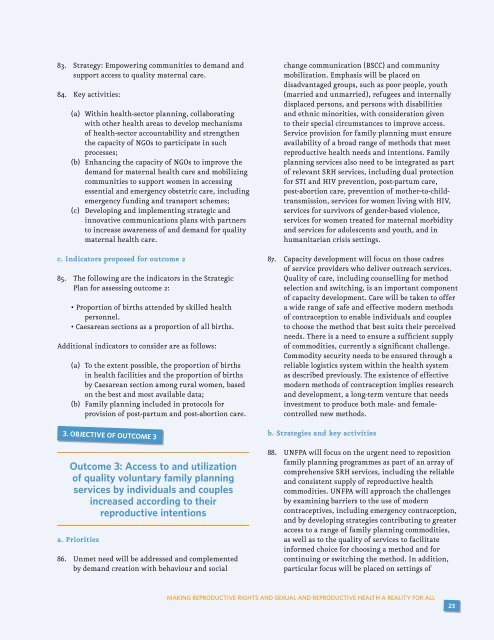Sexual and Reproductive Health Framework - UNFPA
Sexual and Reproductive Health Framework - UNFPA
Sexual and Reproductive Health Framework - UNFPA
Create successful ePaper yourself
Turn your PDF publications into a flip-book with our unique Google optimized e-Paper software.
83. Strategy: Empowering communities to dem<strong>and</strong> <strong>and</strong>support access to quality maternal care.84. Key activities:(a) Within health-sector planning, collaboratingwith other health areas to develop mechanismsof health-sector accountability <strong>and</strong> strengthenthe capacity of NGOs to participate in suchprocesses;(b) Enhancing the capacity of NGOs to improve thedem<strong>and</strong> for maternal health care <strong>and</strong> mobilizingcommunities to support women in accessingessential <strong>and</strong> emergency obstetric care, includingemergency funding <strong>and</strong> transport schemes;(c) Developing <strong>and</strong> implementing strategic <strong>and</strong>innovative communications plans with partnersto increase awareness of <strong>and</strong> dem<strong>and</strong> for qualitymaternal health care.c. Indicators proposed for outcome 285. The following are the indicators in the StrategicPlan for assessing outcome 2:• Proportion of births attended by skilled healthpersonnel.• Caesarean sections as a proportion of all births.Additional indicators to consider are as follows:(a) To the extent possible, the proportion of birthsin health facilities <strong>and</strong> the proportion of birthsby Caesarean section among rural women, basedon the best <strong>and</strong> most available data;(b) Family planning included in protocols forprovision of post-partum <strong>and</strong> post-abortion care.3. objective of outcome 3Outcome 3: Access to <strong>and</strong> utilizationof quality voluntary family planningservices by individuals <strong>and</strong> couplesincreased according to theirreproductive intentionsa. Priorities86. Unmet need will be addressed <strong>and</strong> complementedby dem<strong>and</strong> creation with behaviour <strong>and</strong> socialchange communication (BSCC) <strong>and</strong> communitymobilization. Emphasis will be placed ondisadvantaged groups, such as poor people, youth(married <strong>and</strong> unmarried), refugees <strong>and</strong> internallydisplaced persons, <strong>and</strong> persons with disabilities<strong>and</strong> ethnic minorities, with consideration givento their special circumstances to improve access.Service provision for family planning must ensureavailability of a broad range of methods that meetreproductive health needs <strong>and</strong> intentions. Familyplanning services also need to be integrated as partof relevant SRH services, including dual protectionfor STI <strong>and</strong> HIV prevention, post-partum care,post-abortion care, prevention of mother-to-childtransmission,services for women living with HIV,services for survivors of gender-based violence,services for women treated for maternal morbidity<strong>and</strong> services for adolescents <strong>and</strong> youth, <strong>and</strong> inhumanitarian crisis settings.87. Capacity development will focus on those cadresof service providers who deliver outreach services.Quality of care, including counselling for methodselection <strong>and</strong> switching, is an important componentof capacity development. Care will be taken to offera wide range of safe <strong>and</strong> effective modern methodsof contraception to enable individuals <strong>and</strong> couplesto choose the method that best suits their perceivedneeds. There is a need to ensure a sufficient supplyof commodities, currently a significant challenge.Commodity security needs to be ensured through areliable logistics system within the health systemas described previously. The existence of effectivemodern methods of contraception implies research<strong>and</strong> development, a long-term venture that needsinvestment to produce both male- <strong>and</strong> femalecontrollednew methods.b. Strategies <strong>and</strong> key activities88. <strong>UNFPA</strong> will focus on the urgent need to repositionfamily planning programmes as part of an array ofcomprehensive SRH services, including the reliable<strong>and</strong> consistent supply of reproductive healthcommodities. <strong>UNFPA</strong> will approach the challengesby examining barriers to the use of moderncontraceptives, including emergency contraception,<strong>and</strong> by developing strategies contributing to greateraccess to a range of family planning commodities,as well as to the quality of services to facilitateinformed choice for choosing a method <strong>and</strong> forcontinuing or switching the method. In addition,particular focus will be placed on settings ofMAKING REPRODUCTIVE RIGHTS AND SEXUAL AND REPRODUCTIVE HEALTH A REALITY FOR ALL23
















